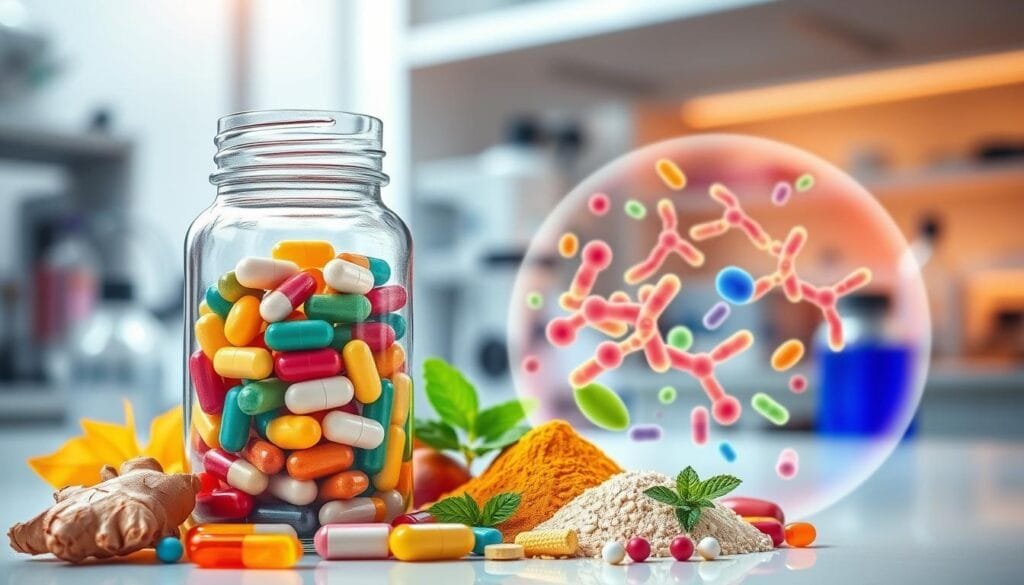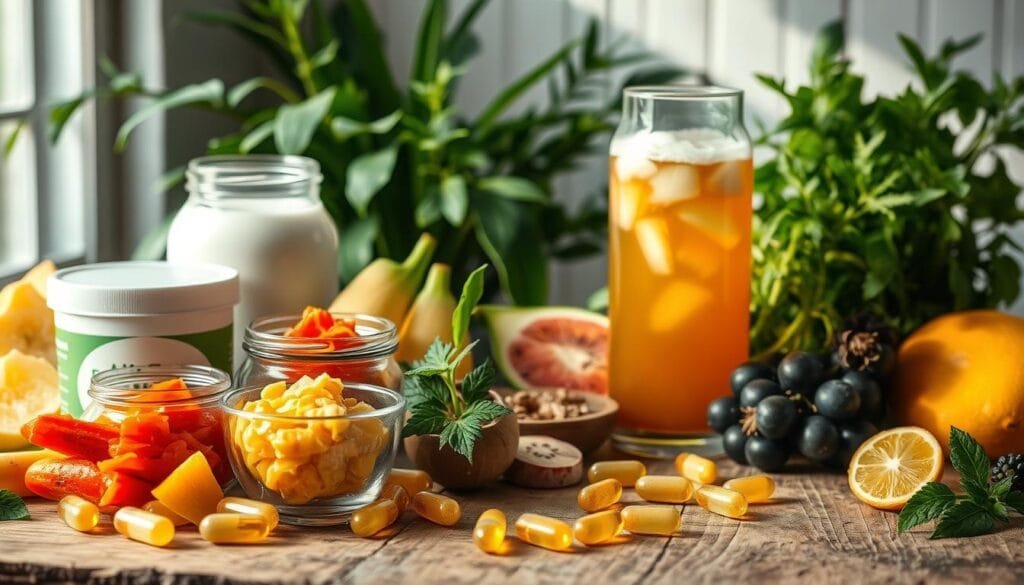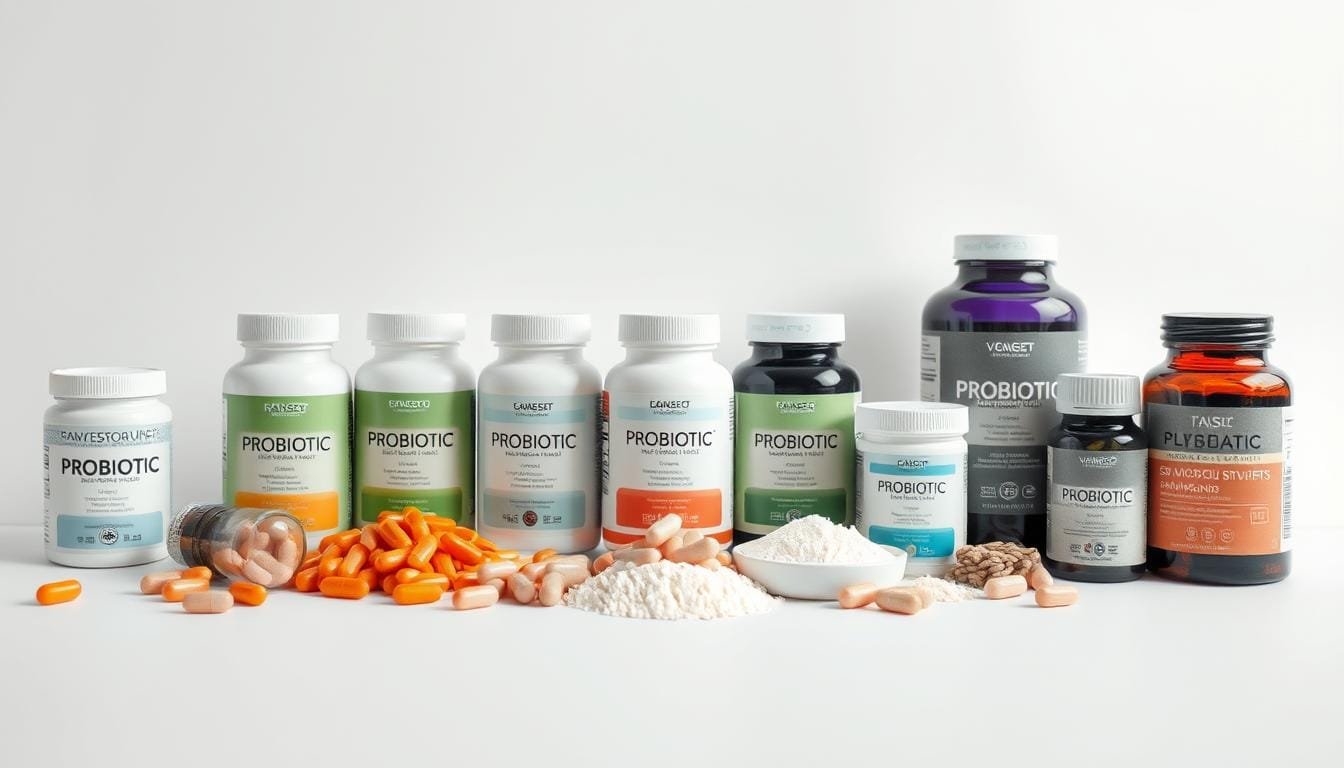Currently Empty: RM0.00
Probiotics are living microorganisms that offer significant health benefits when consumed in proper amounts. These tiny helpers play a vital role in maintaining digestive balance, strengthening the intestinal barrier, and supporting immune function. For those exploring ways to enhance their wellness, understanding how to select effective probiotics can make all the difference.
A high-quality probiotic does more than just survive stomach acid—it thrives in the gut to crowd out harmful bacteria. Key factors like strain specificity, colony-forming units (CFUs), and product stability determine whether a supplement delivers real results. With countless options available, knowing what to prioritize ensures you invest in products that align with your body’s needs.
This guide simplifies the science behind probiotics, breaking down how they interact with the digestive system and contribute to overall health. Readers will learn to identify quality markers in supplements, from clinical research backing specific strains to storage requirements that preserve potency. Whether seeking relief from bloating or aiming to boost immunity, the right probiotic can become a cornerstone of daily wellness routines.
Key Takeaways
- Effective probiotics require specific strains backed by scientific research.
- Colony-forming units (CFUs) indicate a product’s potency and viability.
- Survivability through stomach acid ensures microbes reach the gut alive.
- Quality supplements include storage instructions to maintain freshness.
- Probiotic benefits extend beyond digestion to immune and mental health.
Understanding Probiotics: Definition and Health Benefits
Trillions of tiny allies work daily in your digestive system to keep you healthy. These microorganisms, known as probiotics, include not just familiar bacteria but also beneficial yeasts and molds. They form a dynamic ecosystem that directly impacts how you absorb nutrients and fight infections.
What Are Probiotics?
Probiotics are live health-supporting microbes found in supplements and fermented foods. While many associate them with yogurt cultures like Lactobacillus, they also include yeast strains such as Saccharomyces boulardii. Even specialized viruses called bacteriophages help maintain microbial balance by targeting harmful bacteria.
These organisms survive digestion to colonize the intestines. Once established, they produce compounds that inhibit pathogens and strengthen the intestinal lining. This makes them essential for both immediate digestive comfort and long-term wellness.
Role in Gut Microbiome and Well-being
Your gut microbiome acts as a control center for multiple bodily functions. It breaks down complex carbohydrates, synthesizes vitamins like B12, and regulates 70% of your immune cells. Research shows it even communicates with the brain through neurotransmitter production.
Adding probiotics supports this intricate system in three ways:
- Crowding out undesirable bacteria through competition
- Strengthening mucus layers in the intestinal wall
- Producing short-chain fatty acids that reduce inflammation
This synergy explains why quality probiotics do more than ease bloating—they contribute to clearer skin, better mood regulation, and stronger disease resistance. Choosing strains backed by clinical studies ensures you harness these benefits effectively.
What is most important in a probiotic?
Navigating the crowded probiotic market requires understanding what separates ordinary products from truly effective microbial allies. Quality markers and formulation science determine whether these supplements deliver tangible benefits or simply pass through your system.

Key Attributes for Effective Probiotic Supplements
Look for products guaranteeing 107 to 1011 CFU per gram through their expiration date—not just at production. Third-party certifications like USP Verified or Non-GMO Project seals offer assurance against contamination. Temperature-resistant strains in dark glass bottles often outperform refrigerated options in tropical climates like Malaysia.
Multi-strain formulas typically outperform single-strain versions. For example, combining Lactobacillus acidophilus with Bifidobacterium lactis enhances immune support and digestion. Always verify strain codes (like DSM-17938) match those used in clinical trials for proven effects.
Comparing Dietary Supplements and Fermented Foods
While kimchi and yogurt provide beneficial microbes, their CFU counts fluctuate based on preparation methods. Supplements offer precise doses—critical when targeting specific concerns like optimal timing for consumption. Fermented foods add nutritional value but shouldn’t replace clinically studied probiotic supplements for therapeutic needs.
Packaging matters as much as potency. Oxygen-resistant capsules protect delicate strains better than loose powders. For maximum viability, choose products listing expiration dates rather than manufacturing dates—this ensures live microbes survive until you take them.
Exploring Probiotic Strains and Their Functions
The microbial world teems with specialized workers, each designed for distinct roles in maintaining wellness. Among these, probiotic strains act like skilled tradespeople—some build defenses, others repair systems, and a few tackle specific invaders. Recognizing their unique capabilities helps users select supplements that align with personal health goals.
Lactobacillus and Bifidobacterium Overview
Lactobacillus species dominate discussions about probiotic bacteria for good reason. These acid-producing microbes thrive in the small intestine, mouth, and vaginal tract. Strains like L. acidophilus help manage cholesterol levels while supporting vaginal flora balance.
Meanwhile, Bifidobacterium strains specialize in large intestine health. As pioneers in infant gut ecosystems, they break down complex fibers and produce essential vitamins. Adults benefit from their ability to strengthen intestinal walls and reduce inflammation.
Specialist Strains and Their Unique Benefits
Beyond these giants lie niche performers with targeted effects. Saccharomyces boulardii, a yeast strain, combats diarrhea caused by antibiotics or infections. Clinical studies show it outperforms many bacterial strains in pathogen resistance.
Other specialists include:
- Lactobacillus rhamnosus GG: Reduces antibiotic-related digestive distress by 50% in trials
- Bifidobacterium bifidum: Enhances vitamin K production for bone health
- Streptococcus thermophilus: Accelerates lactose digestion in dairy-sensitive individuals
Combining complementary probiotics creates synergistic teams—like pairing a fiber-digesting strain with one that produces immune-boosting compounds. This teamwork amplifies overall benefits beyond what single strains achieve.
Probiotics in Your Daily Diet: Foods and Supplements
Integrating beneficial microorganisms into meals doesn’t require complex protocols—just smart choices from grocery aisles and supplement shelves. Both natural fermented dairy products and modern formulations offer pathways to nurture your gut ecosystem.

Fermented Dairy and Non-Dairy Options
Yogurt and kefir stand out as accessible sources of live cultures. These fermented dairy products deliver calcium and protein alongside strains like Lactobacillus bulgaricus. For lactose-sensitive individuals, tangy sauerkraut or spicy kimchi provide diverse bacterial communities without dairy.
Malaysia’s tropical climate favors fermented staples like tempeh and miso. These soybean-based foods develop robust microbial profiles during fermentation. Always check labels for “live active cultures” to ensure potency.
Nutritional Supplements and CFU Importance
When foods fall short in microbial counts, capsules and powders bridge the gap. Quality probiotic supplements guarantee specific CFU levels—often exceeding 109 per dose—unlike variable fermented items.
Look for enteric-coated capsules that survive stomach acid. This ensures maximum live microorganisms reach intestinal habitats. Pairing supplements with fiber-rich foods creates an ideal environment for colonization.
Consistency matters most. Whether through daily kombucha or timed supplements, regular intake maintains microbial diversity for lasting digestive harmony.
How Probiotics Support Digestive and Immune Health
Your body teams up with probiotics like a well-choreographed dance troupe, working to protect and enhance multiple systems simultaneously. These microbial partners don’t just occupy space—they actively remodel their environment to benefit both digestive tract efficiency and immune system readiness.
Enhancing Intestinal Barrier Function
A robust barrier in the gut acts like a bouncer, keeping troublemakers out. Probiotics thicken the intestinal lining by stimulating mucus production, creating a sticky shield against toxins. This reinforced barrier prevents undigested food particles and pathogens from triggering inflammation elsewhere in the body.
Balancing the Digestive Tract
Think of your gut microbiota as a bustling city where good microbes outcompete harmful squatters. Probiotics consume resources that pathogens need, starving them into retreat. They also produce compounds that lower gut pH, making the environment hostile to invaders.
This microbial balance influences more than digestion—it affects serotonin levels, which regulate both mood and intestinal contractions. For those managing digestive issues, selecting the right strains can amplify these benefits.
Modulating Immune Responses
Nearly 70% of immune system cells reside in the gut. Probiotics act as trainers, teaching these cells to recognize threats without overreacting to harmless substances. They also increase antibody production, providing faster responses to genuine pathogens.
Regular probiotic use strengthens this alliance, helping maintain health while reducing unnecessary inflammation. The result? A body better equipped to handle challenges from seasonal sniffles to chronic conditions.
Scientific Insights: Research, Quality, and Safety Assurance
Behind every effective probiotic lies rigorous science ensuring its safety and impact. Cutting-edge research bridges lab discoveries to shelf-ready products, with quality control measures protecting both potency and consumer trust.
Understanding CFU and Safety Seals
Colony-forming units (CFUs) reveal how many live microbes survive until expiration—not just production. Look for third-party certifications like NSF International, which verify label accuracy and screen for contaminants. These safety seals matter more in tropical climates where heat threatens product stability.
The Advantage of Multi-Strain Formulations
Studies on antibiotic-related diarrhea and ulcerative colitis show multi-strain probiotics deliver stronger effects than single-strain options. A cholesterol review found only blends significantly lowered LDL levels in adults. Diverse microbial teams work synergistically, addressing multiple health concerns simultaneously.
While taking probiotics generally poses low risk, temporary bloating remains the most common side effect. Always consult healthcare providers when combining supplements with medications. Prioritizing science-backed formulas ensures you harness various health benefits safely and effectively.
FAQ
How do probiotics improve gut microbiome balance?
Probiotics introduce beneficial bacteria to the digestive tract, crowding out harmful microbes. They strengthen the intestinal barrier, aid digestion, and produce compounds like short-chain fatty acids that support overall gut health.
Are fermented foods enough for daily probiotic needs?
Fermented dairy products like yogurt or kefir and non-dairy options like kimchi provide live cultures. However, supplements with targeted strains and higher CFU counts may better address specific issues like irritable bowel syndrome or immune support.
Why do some probiotic supplements include multiple strains?
Multi-strain formulas, such as those combining Lactobacillus and Bifidobacterium, work synergistically. Different strains perform unique roles—like easing bloating or enhancing nutrient absorption—for broader digestive and immune system benefits.
How does CFU count impact a probiotic’s effectiveness?
Colony-forming units (CFUs) indicate live microorganism quantity. Higher CFUs (10–50 billion) ensure enough bacteria survive stomach acid to colonize the gut. Look for delayed-release capsules or research-backed strains for optimal results.
Can probiotics help with irritable bowel syndrome symptoms?
Certain strains, like Lactobacillus plantarum or Bifidobacterium infantis, reduce bloating and irregular bowel movements. Always choose supplements tested in clinical trials for IBS management and consult a healthcare provider.
What safety certifications should a quality probiotic have?
Trusted brands like Culturelle or Renew Life use third-party testing and seals like NSF or USP. These verify potency, purity, and that labels match contents, ensuring safe dietary supplements free from contaminants.
Do probiotics interact with the immune system?
Yes! Over 70% of immune cells reside in the gut. Probiotics like Saccharomyces boulardii enhance immune responses by regulating inflammation and improving communication between gut microbiota and defense cells.


